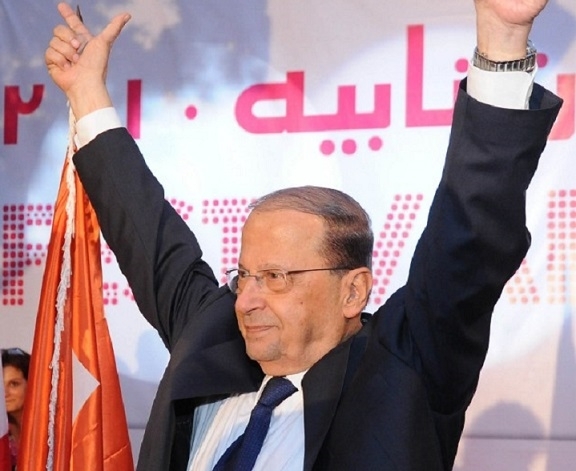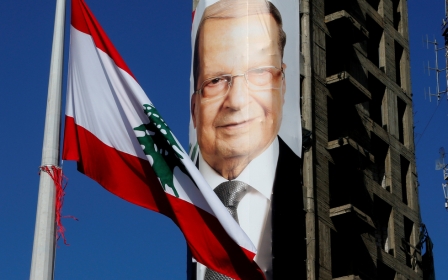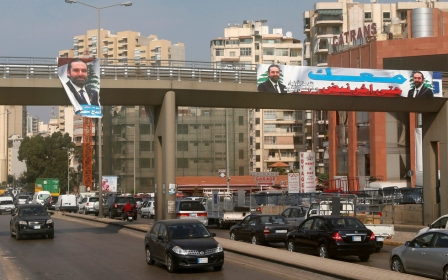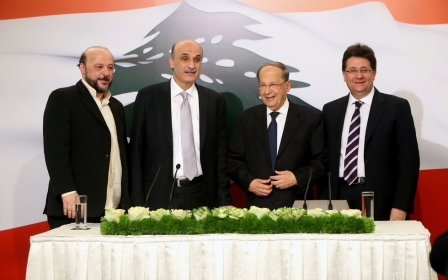Michel Aoun: Political survivor finally returns to power

From fleeing in his pyjamas as Syrian jets pounded the presidential palace, to being ousted as prime minister after one year in office, 81-year-old Michel Aoun has had a tumultuous road to becoming the 13th president of Lebanon.
Known for his lifelong opposition to Syrian influence in Lebanon, the former army commander returned to his country of origin in 2005, after living in exile for more than 14 years.
His installation as president is being viewed by many within the country and region as making no difference to the political situation in Lebanon, with many viewing Aoun’s rise to power as part of a power play to re-install Saad al-Hariri as prime minister.
Commonly known in Lebanon as “the general”, Michel Aoun was born to a Maronite Christian family in Beirut in 1935.
He rose to fame during the bleakest years of Lebanon’s history after rising up in the ranks of the Lebanese army to become Lebanon's top army commander in 1984, before being named interim prime minister by President Amin Gemayel in 1988.
Remembered for fighting two wars during the late 80s - one against Syrian forces in Lebanon, and another against a powerful Christian militia known as the Lebanese Forces, Aoun - like many other Lebanese warlords - was accused of perpetrating war crimes.
As prime minister, Aoun was vocal in his opposition to Syria’s control of Lebanon, repeatedly vowing to free Lebanon from foreign domination.
This led him to be heavily critical of the 1989 Taif Agreement which ended the Lebanese civil war and reduced the political powers of Lebanon's once dominant Maronite Christians.
The Taif deal included the authority of the president being reserved exclusively for Maronites while increasing the powers of the Sunni prime minister.
This opposition subsequently led him to be forced out of office and later into exile in 1990, as the Syrian army pounded the presidential palace.
From exile in France, Aoun lobbied against Syrian domination of Lebanon as Damascus kept troops stationed throughout the country with the head of Syrian intelligence in Lebanon then viewed as the country's de facto ruler.
He supported Western moves to end Syria's dominance and famously lobbied the American government to pass the US Syria Accountability Act.
He also lobbied the US government in the early 2000s to push for UN Security Council resolution 1559 to disarm all militias in Lebanon, including the Iranian-backed Hezbollah.
The resolution also called for free and fair presidential elections and withdrawal of foreign forces.
Aoun returned to Lebanon after Syrian armed forces withdrew in 2005 following the assassination of former prime minister Rafik al-Hariri.
His return from exile at the time was greeted with mass fanfare and celebration by his Maronite constituency, as he called for an end to sectarianism and corruption in Lebanon. Other factions, however, viewed his return with suspicion.
Addressing supporters in Beirut's Martyrs' Square, Aoun declared Lebanon free and independent. But he did not join the "March 14" coalition that grouped other opponents of Syria's role in Lebanon, many of whom were his adversaries from the civil war.
Soon after, Aoun rocked Lebanon’s political landscape by making peace with Syria, his longtime enemy, during a visit to Damascus. In 2006, he formed an alliance with Hezbollah.
Aoun appeared alongside Hezbollah leader Hassan Nasrallah at a Beirut church to declare an alliance between his Free Patriotic Movement and the Shia movement. This signified a break from his lifelong opposition to Syria's presence in Lebanon and its ally Hezbollah.
The alliance has continued to this day. Aoun supported Hezbollah in its war with Israel in 2006. His party then mobilised with Hezbollah in an attempt to bring down Prime Minister Fouad Siniora's government, which was backed by the West and Saudi Arabia.
As his party garnered greater power, however, Aoun’s maverick reputation took a beating. His son-in-law, Gebran Bassil, was accused of graft and corruption.
But that did not stop Aoun from handing over the party’s leadership to Bassil in 2015, in an opaque transition that many party activists decried as antithetical to the party’s stated democratic principles.
Hezbollah maintained its support for Aoun's candidacy, even after Hariri nominated another of its allies, Suleiman Franjieh, for the post a year ago.
His road to the presidency has been a long one, and despite the limited powers of his new role, it was met with huge celebrations among Maronite Christians.
New MEE newsletter: Jerusalem Dispatch
Sign up to get the latest insights and analysis on Israel-Palestine, alongside Turkey Unpacked and other MEE newsletters
Middle East Eye delivers independent and unrivalled coverage and analysis of the Middle East, North Africa and beyond. To learn more about republishing this content and the associated fees, please fill out this form. More about MEE can be found here.




